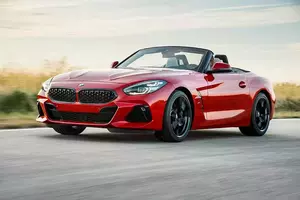
| Vehicle | Curb weight | Difference from world's smallest | Weight to power ratio | 0—60 mph acceleration ratio | Consumption ratio |
|---|---|---|---|---|---|
| 30i |
1415 kg / 3120 lbs |
990 kg (2183 lbs) heavier | 5 kg to 1 hp | 277 kg/s (611 lbs/s) |
236 kg/L (520 lbs/L) |
| 20i |
1405 kg / 3098 lbs |
980 kg (2161 lbs) heavier | 7 kg to 1 hp | 216 kg/s (476 lbs/s) |
207 kg/L (456 lbs/L) |
| M40i |
1535 kg / 3385 lbs |
1110 kg (2448 lbs) heavier | 5 kg to 1 hp | 357 kg/s (787 lbs/s) |
216 kg/L (476 lbs/L) |
| Vehicle | 30i |
|---|---|
| Curb weight |
1415 kg / 3120 lbs |
| Difference from world's smallest | 990 kg (990 lbs) heavier |
| Weight to power ratio | 5 kg to 1 hp |
| 0—60 mph acceleration ratio | 277 kg/s (611 lbs/s) |
| Consumption ratio |
236 kg/L (520 lbs/L) |
| Vehicle | 20i |
| Curb weight |
1405 kg / 3098 lbs |
| Difference from world's smallest | 980 kg (980 lbs) heavier |
| Weight to power ratio | 7 kg to 1 hp |
| 0—60 mph acceleration ratio | 216 kg/s (476 lbs/s) |
| Consumption ratio |
207 kg/L (456 lbs/L) |
| Vehicle | M40i |
| Curb weight |
1535 kg / 3385 lbs |
| Difference from world's smallest | 1110 kg (1110 lbs) heavier |
| Weight to power ratio | 5 kg to 1 hp |
| 0—60 mph acceleration ratio | 357 kg/s (787 lbs/s) |
| Consumption ratio |
216 kg/L (476 lbs/L) |
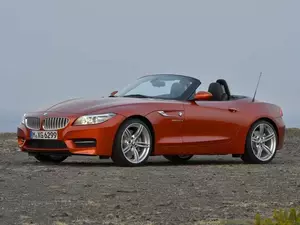
| Vehicle | Curb weight | Difference from world's smallest | Weight to power ratio | 0—60 mph acceleration ratio | Consumption ratio |
|---|---|---|---|---|---|
| 35i |
1525 kg / 3363 lbs |
1100 kg (2426 lbs) heavier | 5 kg to 1 hp | 318 kg/s (701 lbs/s) |
169 kg/L (373 lbs/L) |
| 20i |
1420 kg / 3131 lbs |
995 kg (2194 lbs) heavier | 8 kg to 1 hp | 215 kg/s (474 lbs/s) |
209 kg/L (461 lbs/L) |
| 28i |
1400 kg / 3087 lbs |
975 kg (2150 lbs) heavier | 6 kg to 1 hp | 259 kg/s (571 lbs/s) |
206 kg/L (454 lbs/L) |
| 18i |
1420 kg / 3131 lbs |
995 kg (2194 lbs) heavier | 9 kg to 1 hp | 184 kg/s (406 lbs/s) |
209 kg/L (461 lbs/L) |
| 35is |
1525 kg / 3363 lbs |
1100 kg (2426 lbs) heavier | 4 kg to 1 hp | 332 kg/s (732 lbs/s) |
169 kg/L (373 lbs/L) |
| Vehicle | 35i |
|---|---|
| Curb weight |
1525 kg / 3363 lbs |
| Difference from world's smallest | 1100 kg (1100 lbs) heavier |
| Weight to power ratio | 5 kg to 1 hp |
| 0—60 mph acceleration ratio | 318 kg/s (701 lbs/s) |
| Consumption ratio |
169 kg/L (373 lbs/L) |
| Vehicle | 20i |
| Curb weight |
1420 kg / 3131 lbs |
| Difference from world's smallest | 995 kg (995 lbs) heavier |
| Weight to power ratio | 8 kg to 1 hp |
| 0—60 mph acceleration ratio | 215 kg/s (474 lbs/s) |
| Consumption ratio |
209 kg/L (461 lbs/L) |
| Vehicle | 28i |
| Curb weight |
1400 kg / 3087 lbs |
| Difference from world's smallest | 975 kg (975 lbs) heavier |
| Weight to power ratio | 6 kg to 1 hp |
| 0—60 mph acceleration ratio | 259 kg/s (571 lbs/s) |
| Consumption ratio |
206 kg/L (454 lbs/L) |
| Vehicle | 18i |
| Curb weight |
1420 kg / 3131 lbs |
| Difference from world's smallest | 995 kg (995 lbs) heavier |
| Weight to power ratio | 9 kg to 1 hp |
| 0—60 mph acceleration ratio | 184 kg/s (406 lbs/s) |
| Consumption ratio |
209 kg/L (461 lbs/L) |
| Vehicle | 35is |
| Curb weight |
1525 kg / 3363 lbs |
| Difference from world's smallest | 1100 kg (1100 lbs) heavier |
| Weight to power ratio | 4 kg to 1 hp |
| 0—60 mph acceleration ratio | 332 kg/s (732 lbs/s) |
| Consumption ratio |
169 kg/L (373 lbs/L) |
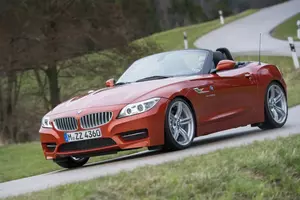
| Vehicle | Curb weight | Difference from world's smallest | Weight to power ratio | 0—60 mph acceleration ratio | Consumption ratio |
|---|---|---|---|---|---|
| 28i |
1475 kg / 3252 lbs |
1050 kg (2315 lbs) heavier | 6 kg to 1 hp | 273 kg/s (602 lbs/s) |
217 kg/L (478 lbs/L) |
| 35i |
1580 kg / 3484 lbs |
1155 kg (2547 lbs) heavier | 5 kg to 1 hp | 322 kg/s (710 lbs/s) |
168 kg/L (370 lbs/L) |
| 20i |
1470 kg / 3241 lbs |
1045 kg (2304 lbs) heavier | 8 kg to 1 hp | 223 kg/s (492 lbs/s) |
216 kg/L (476 lbs/L) |
| 30i |
1505 kg / 3319 lbs |
1080 kg (2382 lbs) heavier | 6 kg to 1 hp | 259 kg/s (571 lbs/s) |
181 kg/L (399 lbs/L) |
| 23i |
1505 kg / 3319 lbs |
1080 kg (2382 lbs) heavier | 7 kg to 1 hp | 218 kg/s (481 lbs/s) |
184 kg/L (406 lbs/L) |
| 35 is |
1600 kg / 3528 lbs |
1175 kg (2591 lbs) heavier | 5 kg to 1 hp | 348 kg/s (767 lbs/s) |
178 kg/L (392 lbs/L) |
| Vehicle | 28i |
|---|---|
| Curb weight |
1475 kg / 3252 lbs |
| Difference from world's smallest | 1050 kg (1050 lbs) heavier |
| Weight to power ratio | 6 kg to 1 hp |
| 0—60 mph acceleration ratio | 273 kg/s (602 lbs/s) |
| Consumption ratio |
217 kg/L (478 lbs/L) |
| Vehicle | 35i |
| Curb weight |
1580 kg / 3484 lbs |
| Difference from world's smallest | 1155 kg (1155 lbs) heavier |
| Weight to power ratio | 5 kg to 1 hp |
| 0—60 mph acceleration ratio | 322 kg/s (710 lbs/s) |
| Consumption ratio |
168 kg/L (370 lbs/L) |
| Vehicle | 20i |
| Curb weight |
1470 kg / 3241 lbs |
| Difference from world's smallest | 1045 kg (1045 lbs) heavier |
| Weight to power ratio | 8 kg to 1 hp |
| 0—60 mph acceleration ratio | 223 kg/s (492 lbs/s) |
| Consumption ratio |
216 kg/L (476 lbs/L) |
| Vehicle | 30i |
| Curb weight |
1505 kg / 3319 lbs |
| Difference from world's smallest | 1080 kg (1080 lbs) heavier |
| Weight to power ratio | 6 kg to 1 hp |
| 0—60 mph acceleration ratio | 259 kg/s (571 lbs/s) |
| Consumption ratio |
181 kg/L (399 lbs/L) |
| Vehicle | 23i |
| Curb weight |
1505 kg / 3319 lbs |
| Difference from world's smallest | 1080 kg (1080 lbs) heavier |
| Weight to power ratio | 7 kg to 1 hp |
| 0—60 mph acceleration ratio | 218 kg/s (481 lbs/s) |
| Consumption ratio |
184 kg/L (406 lbs/L) |
| Vehicle | 35 is |
| Curb weight |
1600 kg / 3528 lbs |
| Difference from world's smallest | 1175 kg (1175 lbs) heavier |
| Weight to power ratio | 5 kg to 1 hp |
| 0—60 mph acceleration ratio | 348 kg/s (767 lbs/s) |
| Consumption ratio |
178 kg/L (392 lbs/L) |
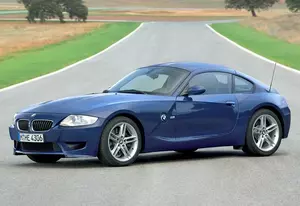
| Vehicle | Curb weight | Difference from world's smallest | Weight to power ratio | 0—60 mph acceleration ratio | Consumption ratio |
|---|---|---|---|---|---|
| 2.5 si |
1290 kg / 2844 lbs |
865 kg (1907 lbs) heavier | 6 kg to 1 hp | 208 kg/s (459 lbs/s) | - |
| 3.0 si |
1395 kg / 3076 lbs |
970 kg (2139 lbs) heavier | 5 kg to 1 hp | 258 kg/s (569 lbs/s) |
157 kg/L (346 lbs/L) |
| 2.5i |
1275 kg / 2811 lbs |
850 kg (1874 lbs) heavier | 7 kg to 1 hp | 190 kg/s (419 lbs/s) | - |
| 2.0i 16V |
1225 kg / 2701 lbs |
800 kg (1764 lbs) heavier | 8 kg to 1 hp | 157 kg/s (346 lbs/s) | - |
| Vehicle | 2.5 si |
|---|---|
| Curb weight |
1290 kg / 2844 lbs |
| Difference from world's smallest | 865 kg (865 lbs) heavier |
| Weight to power ratio | 6 kg to 1 hp |
| 0—60 mph acceleration ratio | 208 kg/s (459 lbs/s) |
| Consumption ratio | - |
| Vehicle | 3.0 si |
| Curb weight |
1395 kg / 3076 lbs |
| Difference from world's smallest | 970 kg (970 lbs) heavier |
| Weight to power ratio | 5 kg to 1 hp |
| 0—60 mph acceleration ratio | 258 kg/s (569 lbs/s) |
| Consumption ratio |
157 kg/L (346 lbs/L) |
| Vehicle | 2.5i |
| Curb weight |
1275 kg / 2811 lbs |
| Difference from world's smallest | 850 kg (850 lbs) heavier |
| Weight to power ratio | 7 kg to 1 hp |
| 0—60 mph acceleration ratio | 190 kg/s (419 lbs/s) |
| Consumption ratio | - |
| Vehicle | 2.0i 16V |
| Curb weight |
1225 kg / 2701 lbs |
| Difference from world's smallest | 800 kg (800 lbs) heavier |
| Weight to power ratio | 8 kg to 1 hp |
| 0—60 mph acceleration ratio | 157 kg/s (346 lbs/s) |
| Consumption ratio | - |
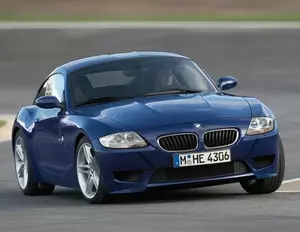
| Vehicle | Curb weight | Difference from world's smallest | Weight to power ratio | 0—60 mph acceleration ratio | Consumption ratio |
|---|---|---|---|---|---|
| 3.0 si |
1325 kg / 2922 lbs |
900 kg (1985 lbs) heavier | 5 kg to 1 hp | 245 kg/s (540 lbs/s) | - |
| Vehicle | 3.0 si |
|---|---|
| Curb weight |
1325 kg / 2922 lbs |
| Difference from world's smallest | 900 kg (900 lbs) heavier |
| Weight to power ratio | 5 kg to 1 hp |
| 0—60 mph acceleration ratio | 245 kg/s (540 lbs/s) |
| Consumption ratio | - |
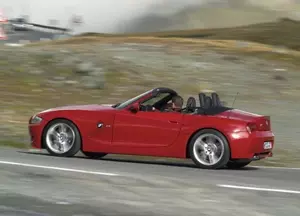
| Vehicle | Curb weight | Difference from world's smallest | Weight to power ratio | 0—60 mph acceleration ratio | Consumption ratio |
|---|---|---|---|---|---|
| 3.2 |
1415 kg / 3120 lbs |
990 kg (2183 lbs) heavier | 4 kg to 1 hp | 295 kg/s (650 lbs/s) | - |
| Vehicle | 3.2 |
|---|---|
| Curb weight |
1415 kg / 3120 lbs |
| Difference from world's smallest | 990 kg (990 lbs) heavier |
| Weight to power ratio | 4 kg to 1 hp |
| 0—60 mph acceleration ratio | 295 kg/s (650 lbs/s) |
| Consumption ratio | - |
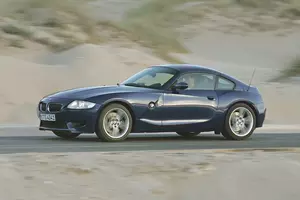
| Vehicle | Curb weight | Difference from world's smallest | Weight to power ratio | 0—60 mph acceleration ratio | Consumption ratio |
|---|---|---|---|---|---|
| 3.2 |
1425 kg / 3142 lbs |
1000 kg (2205 lbs) heavier | 4 kg to 1 hp | 297 kg/s (655 lbs/s) |
118 kg/L (260 lbs/L) |
| Vehicle | 3.2 |
|---|---|
| Curb weight |
1425 kg / 3142 lbs |
| Difference from world's smallest | 1000 kg (1000 lbs) heavier |
| Weight to power ratio | 4 kg to 1 hp |
| 0—60 mph acceleration ratio | 297 kg/s (655 lbs/s) |
| Consumption ratio |
118 kg/L (260 lbs/L) |
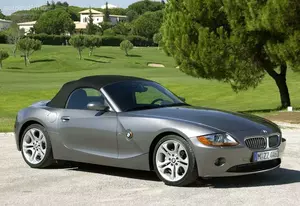
| Vehicle | Curb weight | Difference from world's smallest | Weight to power ratio | 0—60 mph acceleration ratio | Consumption ratio |
|---|---|---|---|---|---|
| 2.2i |
1325 kg / 2922 lbs |
900 kg (1985 lbs) heavier | 8 kg to 1 hp | 182 kg/s (401 lbs/s) |
182 kg/L (401 lbs/L) |
| 2.5i |
1335 kg / 2944 lbs |
910 kg (2007 lbs) heavier | 7 kg to 1 hp | 199 kg/s (439 lbs/s) |
180 kg/L (397 lbs/L) |
| 3.0i |
1365 kg / 3010 lbs |
940 kg (2073 lbs) heavier | 6 kg to 1 hp | 244 kg/s (538 lbs/s) |
182 kg/L (401 lbs/L) |
| Vehicle | 2.2i |
|---|---|
| Curb weight |
1325 kg / 2922 lbs |
| Difference from world's smallest | 900 kg (900 lbs) heavier |
| Weight to power ratio | 8 kg to 1 hp |
| 0—60 mph acceleration ratio | 182 kg/s (401 lbs/s) |
| Consumption ratio |
182 kg/L (401 lbs/L) |
| Vehicle | 2.5i |
| Curb weight |
1335 kg / 2944 lbs |
| Difference from world's smallest | 910 kg (910 lbs) heavier |
| Weight to power ratio | 7 kg to 1 hp |
| 0—60 mph acceleration ratio | 199 kg/s (439 lbs/s) |
| Consumption ratio |
180 kg/L (397 lbs/L) |
| Vehicle | 3.0i |
| Curb weight |
1365 kg / 3010 lbs |
| Difference from world's smallest | 940 kg (940 lbs) heavier |
| Weight to power ratio | 6 kg to 1 hp |
| 0—60 mph acceleration ratio | 244 kg/s (538 lbs/s) |
| Consumption ratio |
182 kg/L (401 lbs/L) |